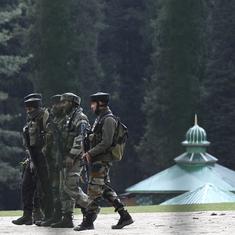Why did Sasikala Natarajan, the closest aide of former Tamil Nadu Chief Minister Jayalalithaa, who died in Chennai’s Apollo Hospital on Monday evening, fail to stake her claim to the chief ministerial post?
As the mortal remains of Jayalalithaa was placed at the iconic Rajaji Hall on Anna Salai for mourners to pay their respects on Tuesday, Sasikala, clad in a black cotton sari, stood right next to the body with a stoic expression. This was reminiscent of December 1987, when Jayalalithaa stood near the remains of her mentor MG Ramachandran for 16 hours, withstanding verbal and physical assaults.
The intriguing drama ensuing in the corridors of the All India Anna Dravida Munnetra Kazhagam has more to it than simple power equations in the party. The answer could lie in the 20-year-old disproportionate assets case that put Jayalalithaa behind bars twice—in 1996 and 2014.
Jayalalithaa’s loyal understudy, O Panneerselvam, was sworn in as chief minister in a solemn ceremony in the early hours of Tuesday. With him, 31 other ministers took oath too. But it was the absence of Sasikala in the arena that raised several questions on the immediate future of the AIADMK, which is now deprived of a mass leader who had absolute control over its ranks.
Corruption case
Jayalalithaa was booked in a disproportionate assets case under the Prevention of Corruption Act in 1996. This was perhaps the lowest point of her career, when the rival Dravida Munnetra Kazhagam government raided her Poes Garden residence and splashed photos of her lavish possessions in the newspapers to dent her image. The defining picture that came out of these raids was that of Jayalalithaa and Sasikala with huge amount of gold on them.
The trial in the disproportionate assets case took 18 years to complete. In September 2014, a special court in Bengaluru convicted Jayalalithaa, Sasikala, Ilavarasi (Sasikala’s sister-in-law) and Sudhakaran (Jayalalithaa’s foster son, who she later disowned) and sentenced them to four years imprisonment with a hefty fine of Rs 100 crore.
Jayalalithaa had to step down from the chief minister’s position and go to jail. In 2015, she was acquitted by the Karnataka High Court in the case and stormed back to lead the government. This was followed by a stupendous victory in the 2016 Assembly elections, when Jayalalithaa created history by becoming the first chief minister after her mentor MG Ramachandran to win a consecutive term.
But the case did not see closure with the verdict. The Congress government in Karnataka went on appeal to the Supreme Court, which reserved judgment in the case in June this year.
Going by the accounts of AIADMK leaders, this case perhaps had a large bearing in the succession plan quickly put together on Monday.
The contents of the case are simple. Jayalalithaa as chief minister between 1991 and 1996 acquired over Rs 63 crore in wealth disproportionate to her known sources of income. Sasikala, and her family members Ilavarasi and Sudhakaran, were accused of being part of the conspiracy to amass this wealth and were booked for abetting the corruption.
Though Jayalalithaa is dead, the law will still apply to the other three. This means that Sasikala and the other two still have a chance of being convicted again.
The Prevention of Corruption has great consequences for a person holding public office under the Representation of Peoples Act.
Section 8 (3) of the Representation of Peoples Act makes it clear that a person convicted under the Prevention of Corruption for a sentence of more than two years stands disqualified from contesting elections for a period of six years from the date of being released from prison.
Previous judgments
On social media, many raised an important query. With the death of Jayalalithaa, the main accused in the case, do the charges against the co-accused cease to exist?
The straightforward answer is a no. The Supreme Court, once and for all, put this question to rest in 2014.
In the State of New Delhi through CBI vs Jitendar Kumar Singh, the Supreme Court took up for consideration two contrasting judgments passed in the Delhi and Bombay High Courts on the question of the co-accused and decided that the proceedings against them will continue even if the main accused died.
The comments in judgment have an uncanny resemblance to the current situation in Tamil Nadu. In its order, the Supreme Court said:
“We can visualise a situation where a public servant dies at the fag end of the trial, by that time, several witnesses might have been examined and to hold that the entire trial would be vitiated due to the death of the sole public servant would defeat the entire object and purpose of the Prevention of Corruption Act.”
Party post
Unlike in 1969 and 1987, when former chief ministers CN Annadurai and MG Ramachandran passed away, the ruling party did not choose to appoint an interim chief minister this time. Panneerselvam took full control of the government within an hour of Jayalalithaa being declared dead, showcasing the eagerness of the AIADMK to keep the DMK and the Bharatiya Janata Party led Centre from attempting any interference.
However, the drama is not yet over. The Prevention of Corruption Act does not bar Sasikala from holding a party position. On Monday, speculation was rife in the AIADMK that she might be given an important post. But no official declaration has yet been made. There were also murmurs that her brother Dhivakaran, who does not have any high-profile cases against him, could officially take up a position in the party to hold control.
This is the first time since its founding in 1972 that the AIADMK could see a person other than the chief minister becoming its head.










